2012 Peugeot 508 headlamp
[x] Cancel search: headlampPage 4 of 340
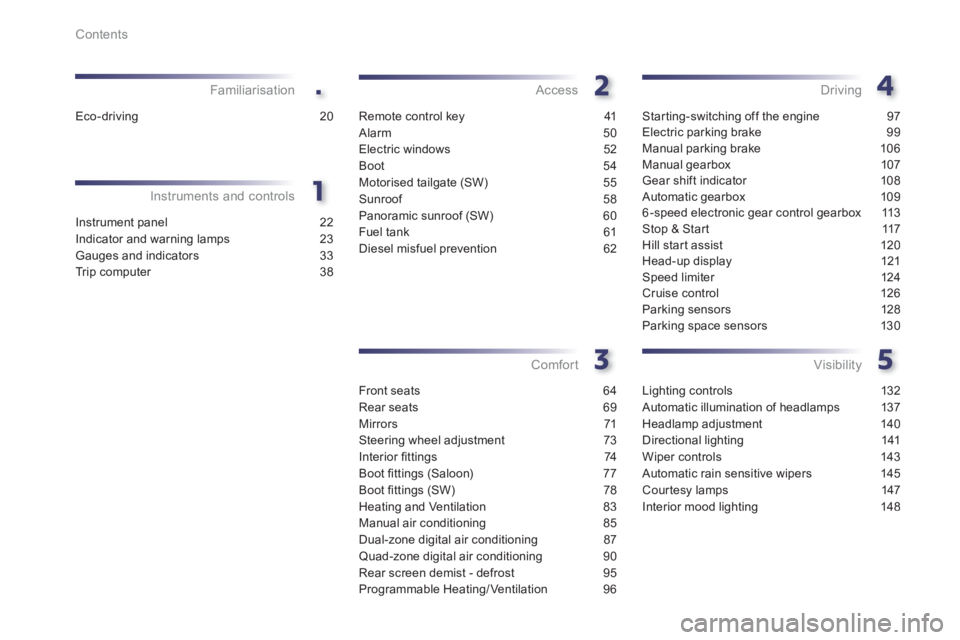
.
Contents
Instrument panel 22
Indicator and warning lamps 23
Gauges and indicators 33
Tr ip computer 38
Instruments and controlsFamiliarisation
Remote control key 41
Alarm 50
Electric windows 52
Boot 54
Motorised tailgate (SW) 55
Sunroof 58
Panoramic sunroof (SW) 60
Fuel tank 61
Diesel misfuel prevention 62
Access
Front seats 64
Rear seats 69
Mirrors 71
Steering wheel adjustment 73
Interior fi ttings 74
Boot fi ttin
gs (Saloon) 77
Boot fi ttings (SW) 78
Heating and Ventilation 83
Manual air conditioning 85
Dual-zone digital air conditioning 87
Quad-zone digital air conditioning 90
Rear screen demist - defrost 95
Programmable Heating/Ventilation 96
Comfort
Starting-switching off the engine 97Electric parking brake 99Manual parking brake 106Manual gearbox 107Gear shift indicator 108Automatic gearbox 1096-speed electronic gear control gearbox 113Stop & Start 117Hill start assist 120Head-up display 121Speed limiter 124Cruise control 126Parking sensors 128Parking space sensors 130
Driving
Lighting controls 132
Automatic illumination of headlamps 137
Headlamp adjustment 140
Directional lighting 141
Wiper controls 143
Automatic rain sensitive wipers 145
Cour tesy lamps 147
Interior mood lighting 148
Visibility
Eco-driving 20
Page 12 of 340
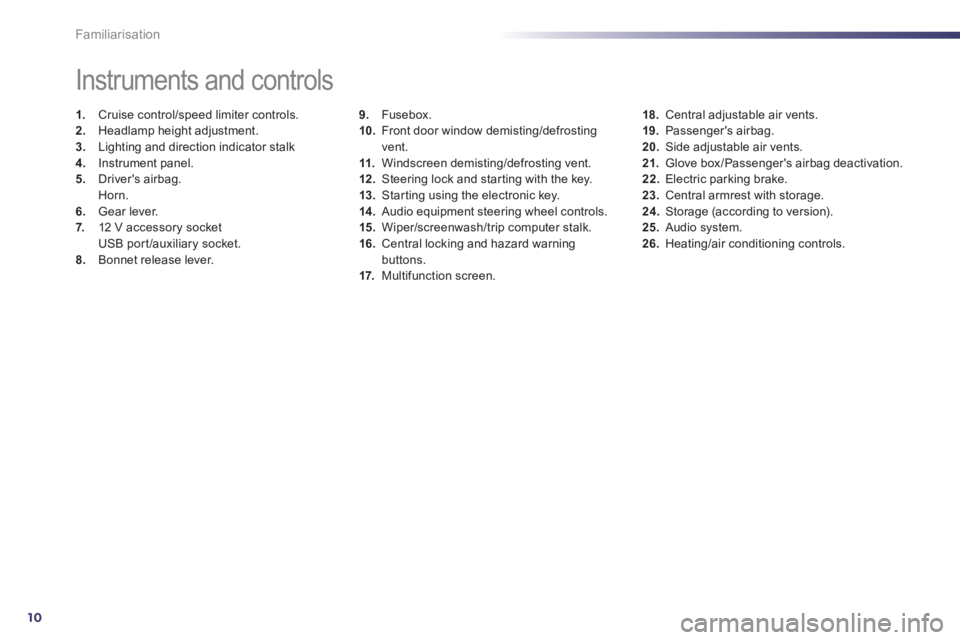
10
Familiarisation
9.Fusebox.
10. Front door window demisting/defrostingvent.
11.Windscreen demisting/defrosting vent. 12 .Steering lock and star ting with the key.
13. Starting using the electronic key. 14 .
Audio equipment steering wheel controls.
15. Wiper/screenwash/trip computer stalk.
16.Central locking and hazard warningbuttons.
17. Multifunction screen.
Instruments and controls
1.
Cruise control/speed limiter controls. 2.
Headlamp height adjustment. 3.
Lighting and direction indicator stalk
4.
Instrument panel. 5.
Driver's airbag.Horn.
6.Gear lever.
7. 12 V accessory socket
USB por t/auxiliary socket.8.Bonnet release lever.
18.Central adjustable air vents.19. Passenger's airbag.20.
Side adjustable air vents.
21.Glove box/Passenger's airbag deactivation. 22.
Electric parking brake. 23.
Central armrest with storage. 24.
Storage (according to version).25.Audio system. 26.Heating/air conditioning controls.
Page 16 of 340
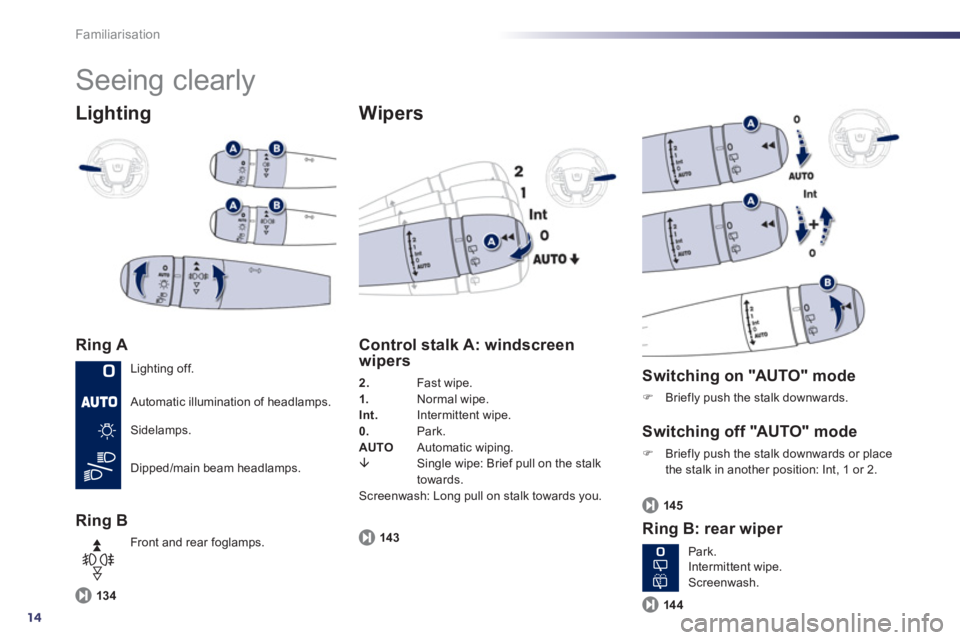
14
Familiarisation
Seeing clearly
Lighting
Ring A
Ring B
Wipers
13 4
Control stalk A: windscreen
wipers
2. Fast wipe. 1. Normal wipe.Int. Intermittent wipe.
0. Park.
AUTO Automatic wiping. �È Single wipe: Brief pull on the stalk
towards.
Screenwash: Long pull on stalk towards you.
143
Switching on "AUTO" mode
�)Briefly push the stalk downwards.
Switching off "AUTO" mode
�)Briefly push the stalk downwards or place
the stalk in another position: Int, 1 or 2.
Ring B: rear wiper
14 5
14
4
Lighting off.
Automatic illumination o
f headlamps.
Sidelamps.
Dipped/main beam headlamps.
Front and rear
foglamps.
Park.
Intermittent wipe.
Screenwash.
Page 22 of 340
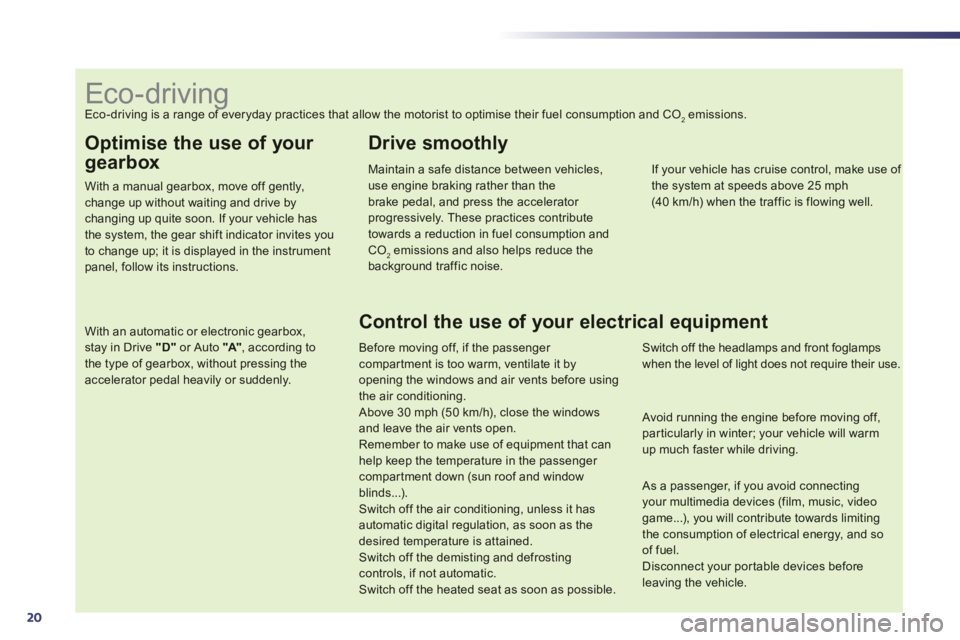
20
Optimise the use of your
gearbox
With a manual gearbox, move off gently,change up without waiting and drive by changing up quite soon. If your vehicle has the system, the gear shift indicator invites youto change up; it is displayed in the instrumentpanel, follow its instructions.
With an automatic or electronic gearbox, stay in Drive "D"or Auto "A" , according to the type of gearbox, without pressing theaccelerator pedal heavily or suddenly.
Drive smoothly
Maintain a safe distance between vehicles,use engine braking rather than thebrake pedal, and press the accelerator progressively. These practices contributetowards a reduction in fuel consumption andCO2emissions and also helps reduce thebackground traffic noise.
If your vehicle has cruise control, make use of the system at speeds above 25 mph (40 km/h) when the traffic is flowing well.
Control the use of your electrical equipment
Before moving off, if the passenger compartment is too warm, ventilate it byopening the windows and air vents before using the air conditioning.
Above 30 mph (50 km/h), close the windows and leave the air vents open.
Remember to make use of equipment that canhelp keep the temperature in the passenger compartment down (sun roof and windowblinds...).
Switch off the air conditioning, unless it has automatic digital regulation, as soon as thedesired temperature is attained. Switch off the demisting and defrostingcontrols, if not automatic. Switch off the heated seat as soon as possible.
Switch off the headlamps and front foglamps when the level of light does not require their use.
Avoid running the engine before moving off,
particularly in winter; your vehicle will warmup much faster while driving.
As a passenger, if you avoid connecting your multimedia devices (film, music, videogame...), you will contribute towards limitingthe consumption of electrical energy, and soof fuel.
Disconnect your por table devices beforeleaving the vehicle.
Eco-driving Eco-driving is a range of everyday practices that allow the motorist to optimise their fuel consumption and CO2emissions.
Page 25 of 340
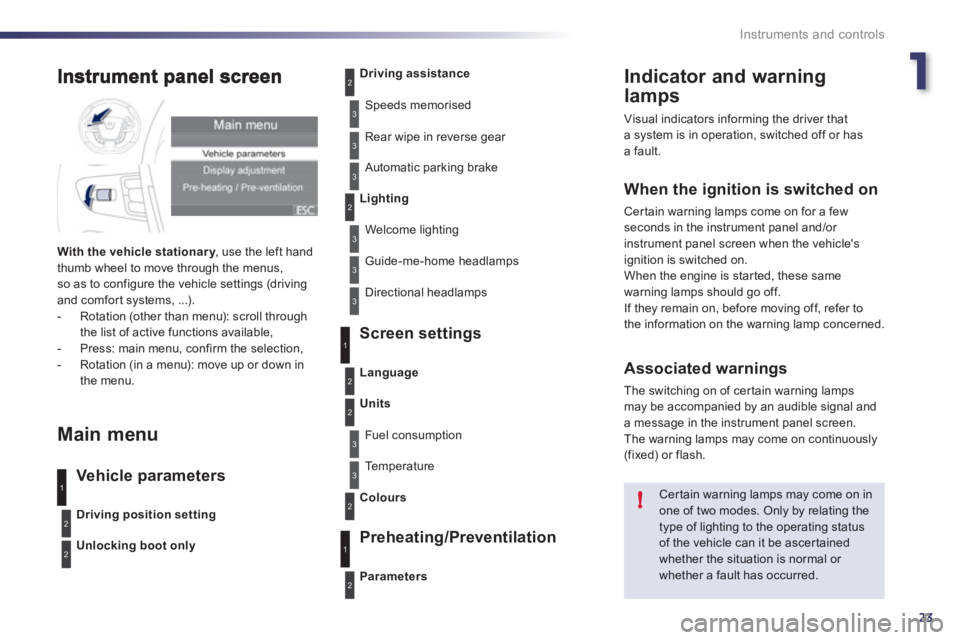
1
23
!
Instruments and controls
Indicator and warning
lamps
Visual indicators informing the driver that
a system is in operation, switched off or hasa fault.
When the ignition is switched on
Certain warning lamps come on for a few seconds in the instrument panel and/or
instrument panel screen when the vehicle's
ignition is switched on.
When the engine is started, these same
warning lamps should go off.
If they remain on, before moving off, refer to
the information on the warning lamp concerned.
Associated warnings
The switching on of cer tain warning lamps
may be accompanied by an audible signal and
a message in the instrument panel screen.
The warning lamps may come on continuously(fixed) or flash.
Certain warning lamps may come on inone of two modes. Only by relating thetype of lighting to the operating status
of the vehicle can it be ascertainedwhether the situation is normal or whether a fault has occurred.
1
2
2
2
3
3
3
2
3
3
With the vehicle stationar y, use the left handythumb wheel to move through the menus,so as to configure the vehicle settings (driving
and comfor t systems, ...).
- Rotation (other than menu): scroll through
the list of active functions available,
- Press: main menu, confirm the selection,
- Rotation (in a menu): move up or down in
the menu.
Main menu
Vehicle parameters Screen settin
gs
Preheatin
g/Preventilation
Driving position setting
Unlocking boot only
Driving assistance
Speeds memorised
Rear wipe in reverse
gear
Automatic parking brake
Lighting
Welcome lighting
Guide-me-home headlamps
Directional headlamps
Parameters
Language
Units
Fuel consumption
Te m p e r a t u r e
Colour
s
3
1
2
2
3
2
3
1
2
Page 26 of 340
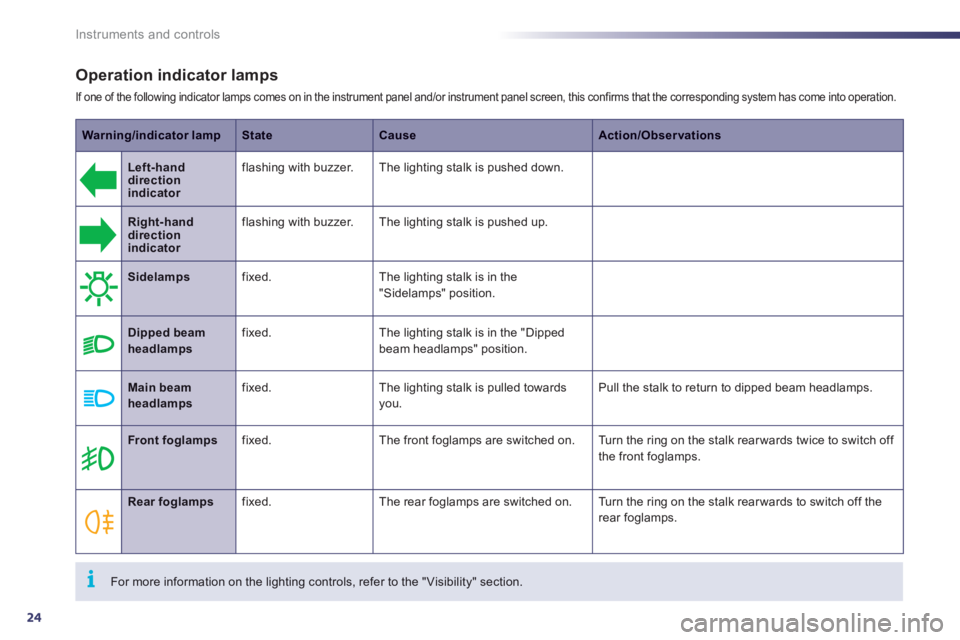
24
i
Instruments and controls
Operation indicator lamps
If one of the following indicator lamps comes on in the instrument panel and/or instrument panel screen, this confirms that the corresponding system has come into operation.
Warning/indicator lampStateCauseAction/Observations
Left-hand direction indicator
flashing with buzzer. The lighting stalk is pushed down.
Right-hand direction indicator
flashing with buzzer. The lighting stalk is pushed up.
Sidelampsfixed.The lighting stalk is in the
"Sidelamps" position.
Dipped beamheadlampsfixed.The lighting stalk is in the "Dippedbeam headlamps" position.
Main beam headlampsfixed.The lighting stalk is pulled towardsyou. Pull the stalk to return to dipped beam headlamps.
Front foglampsfixed.The front foglamps are switched on. Turn the ring on the stalk rear wards twice to switch off
the front foglamps.
Rear foglampsfixed.The rear foglamps are switched on. Turn the ring on the stalk rear wards to switch off the
rear foglamps.
For more information on the lighting controls, refer to the "Visibility" section.
Page 34 of 340
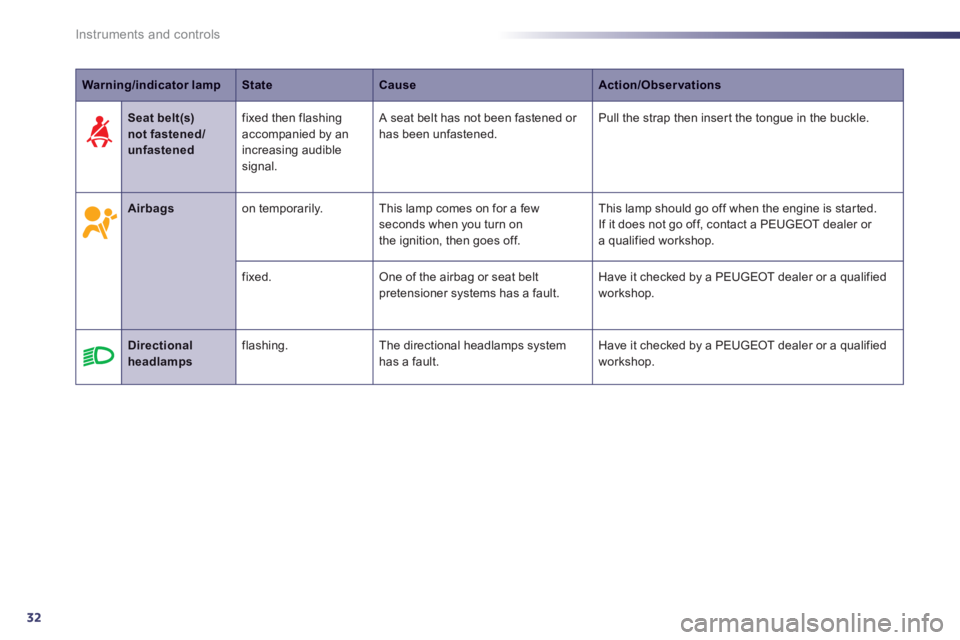
32
Instruments and controls
Warning/indicator lampStateCauseAction/Observations
Airbagson temporarily. This lamp comes on for a fewseconds when you turn on
the ignition, then goes off.This lamp should
go off when the engine is started.
If it does not go off, contact a PEUGEOT dealer or
a qualified workshop.
fix
ed.One of the airbag or seat beltpretensioner systems has a fault.Have it checked by a PEUGEOT dealer or a qualified
workshop.
Directionalheadlampsflashing.The directional headlamps systemhas a fault.Have it checked by a PEUGEOT dealer or a qualified
workshop.
Seat belt(s) not fastened/unfastened
fixed then flashingaccompanied by anincreasing audiblesignal. A
seat belt has not been fastened or has been unfastened.Pull the strap then insert the tongue in the buckle.
Page 36 of 340
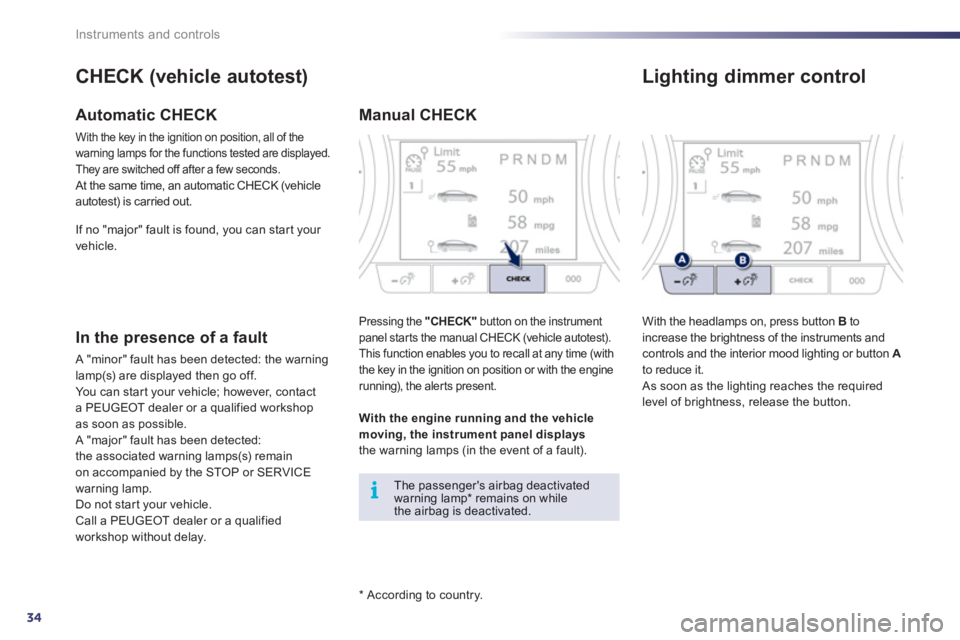
34
i
Instruments and controls
* According to country.
CHECK (vehicle autotest)
Automatic CHECK
With the key in the ignition on position, all of the
warning lamps for the functions tested are displayed.
They are switched off after a few seconds. At the same time, an automatic CHECK (vehicle autotest) is carried out.
In the presence of a fault
A "minor" fault has been detected: the warning
lamp(s) are displayed then go off.You can star t your vehicle; however, contact a PEUGEOT dealer or a qualified workshop as soon as possible.
A "major" fault has been detected:
the associated warning lamps(s) remain
on accompanied by the STOP or SERVICE
warning lamp.
Do not star t your vehicle. Call a PEUGEOT dealer or a qualified
wor
kshop without delay.
Manual CHECK
Pressing the "CHECK"button on the instrument
panel star ts the manual CHECK (vehicle autotest).
This function enables you to recall at any time (with
the key in the ignition on position or with the engine
running), the aler ts present.
The passenger's airbag deactivated warning lamp * remains on while the airbag is deactivated.
With the en
gine running and the vehiclemoving, the instrument panel displaysthe warning lamps (in the event of a fault). I
f no "major" fault is found, you can star t your
vehicle.
Lighting dimmer control
With the headlamps on, press button B
to
increase the brightness of the instruments and controls and the interior mood lighting or button Ato reduce it.
As soon as the lighting reaches the required
level of brightness, release the button.